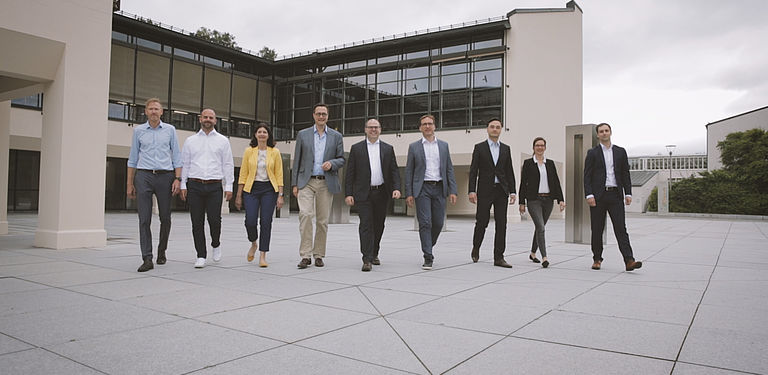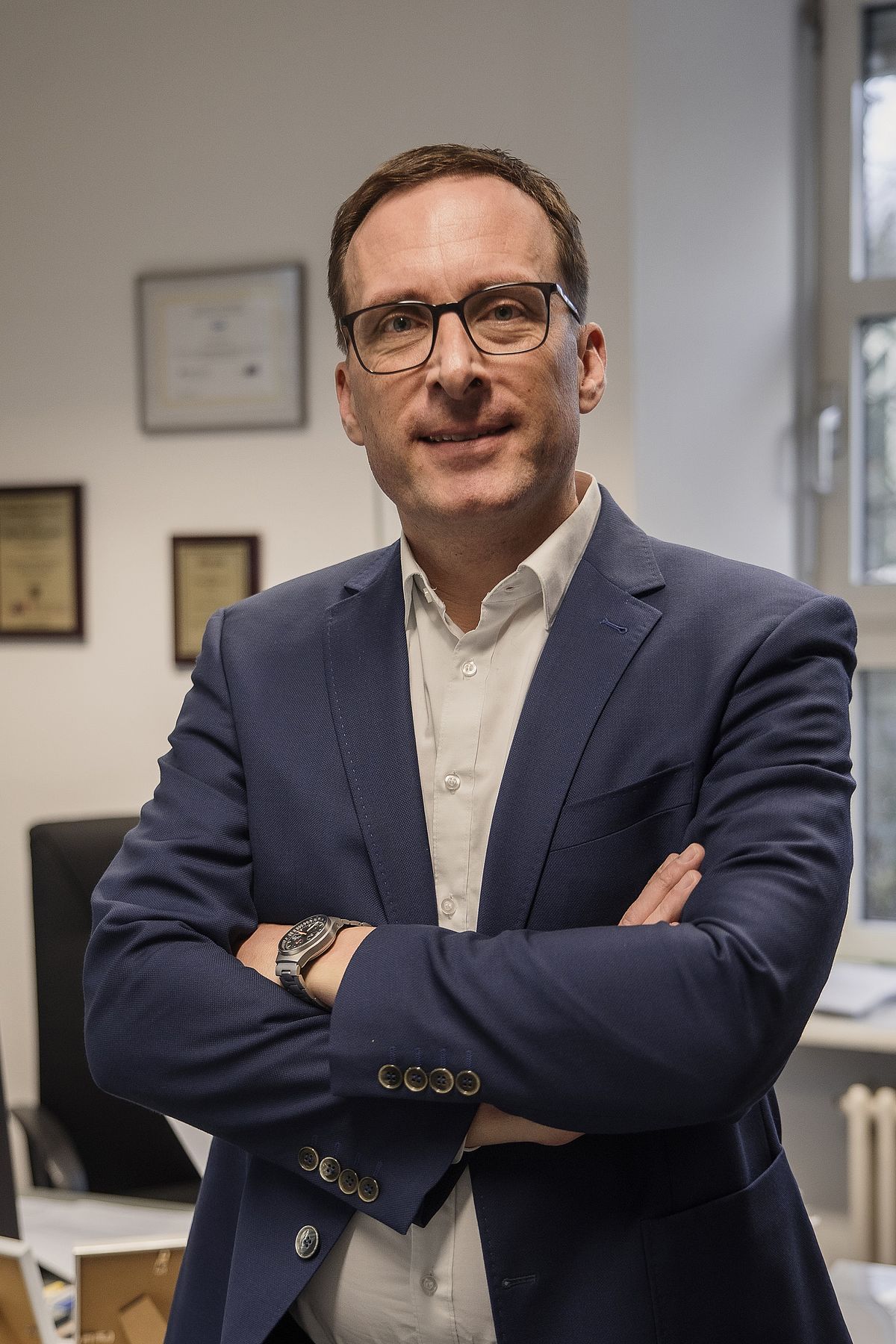In many ways, 2023 has been a busy and eventful year for the University of Passau. From the perspective of research: What, in your view, was particularly relevant – and what developments are you especially excited about?
In this connection, I should particularly like to mention the signing of the higher education accord, which will be our master plan over the next few years. Also, the higher education accord now gives us resources to address the ambitious goals we have set ourselves together with the Science Ministry. This university has more than enough potential to achieve these objectives. I had that notion even before I took office, but once I had been given a chance to engage further with individual colleagues, I was nonetheless amazed and continue to be thrilled.
Why is that?
We truly have incredibly good researchers at our university producing outstanding achievements at an individual level, with some of them also involved in numerous attractive projects and clusters, both internally and externally. Our goal now is to become more effective in pooling and networking these dynamics and our potential under the higher education accord so we can continue to develop research focuses at the university that enjoy high visibility and hold strong appeal even outside the campus. The DFG Research Training Group "Digital Platform Ecosystems" is a case in point, although the university clearly still needs a further boost through additional clusters. The conversations I've had so far have shown me that these emerging clusters actually work on subject matters that tie in with our work and this will allow us to create an attractive and productive research ecosystem. The Bavarian Research Network for Digital Security is one such example where I'm very happy about how it has developed under our leadership over the past year. We have been able to demonstrate that we, as a university, are able to make this topic our own and successfully create clusters that reach across Bavaria.
Apart from all the positives: To what extent is this a challenge?
Naturally it's a challenge. After all, it entails a high level of willingness to embrace change. If we intend to achieve our objectives and make better use of our opportunities, we, collectively as a university, will have to do things differently than before and shake up some of the processes and, of course, do our best to get all the stakeholders on the same page. It’s anything but easy and can't be hurried – but at the same time such a broad communication process is very much worthwhile. If we want to become more visible as a university that is acting on its commitment and successfully doing some things differently and better than others, then we need a common understanding of what is strategically important and necessary for the university today, even if the various professorships and chairs are often affected differently. The challenges are not new, they are merely becoming ever more urgent. The president has repeatedly made this very clear in his communications. I visited all the faculties over the past year and will be visiting the hubs this year (editors' note: The hubs are the forums for the University of Passau's three focal points: Europe, sustainability and digitalisation). I also enjoy engaging with colleagues seeking to talk to me about research-related topics.
DFG Research Training Group 2720: "Digital Platform Ecosystems (DPE)"
From October 2022, the Research Training Group "Digital Platform Ecosystems" will be the University’s pivotal hub for leading-edge, international, and interdisciplinary research and advanced academic qualifications around a central phenomenon of the digital economy.
The University of Passau has set itself the goal of financially supporting high-level project applications and projects in an even more targeted manner. Where is this going?
We need to intensify our efforts towards obtaining external funds for our research. This became so much clearer during our negotiations with the ministry over the past year. We cannot expect funding from external sources to increase of their own accord. On the contrary, we need to reckon with cuts in light of the current budgetary situation. But the good news is that we can help ourselves by getting things moving and being more consistent than before when looking for external funding sources. We've certainly got the potential that I referred to earlier. So, it's not only about the volume but also about the origin of funds, by which I mean the success we've had with specific funders and in programmes with an accomplished reputation. To get things moving at this level and make sure continuously driving forward applications becomes the norm, that is certainly one of the key overarching goals. These efforts have been bolstered not only by the redesigned research and transfer pool. Given these circumstances, we've made a conscious decision to allocate research and teaching funds from third sources more directly to the units and divisions that are particularly active and successful – as a way to encourage initiatives taking on such ambitious goals and as a source of motivation.
Does that mean particularly active researchers can expect new incentives?
If you're active in third-party funded research, you don't end up with a zero-sum game nor is your room for manoeuvre at the chairs or the professorship reduced; your scope actually becomes broader. What's even more important though: If these efforts turn out to be successful, not only every single person will benefit but the entire university and its reputation. So, in my book, these goals do not constitute external constraints. I find that we owe it to ourselves as the University of Passau to strengthen our position by tapping the potential we already have. Mind you, the to-do list we've been given clearly states that we need to do better in some areas. Making good on that will be decisive for the university's development going forward. We'll only succeed, however, if the university as a whole pulls together.
Excellent research needs chairs and professorships with outstanding minds. In light of this, strategic appointments are a critically important tool for the university's development. Where do we currently stand with that?
We've got things moving in that respect. For large projects we need both established researchers with an exceptional reputation and early career researchers who've already notched up initial notable successes. While we do have lots of great minds here, we need to set accents and draw additional strength from outside in order to achieve a critical mass in certain fields. Bringing these people to our university is an important task that comes with enormous opportunities. We've successfully taken advantage of the first few opportunities to recruit excellence. Now, we are continuing our efforts to enlist interested researcher and integrate them as best we can.
What makes the University of Passau attractive for this target group?
A number of different factors come into play here: On the one hand, there is the subject-matter proximity to the expertise of outstanding researchers already working here and thus the prospects of developing together as researchers. On the other hand, we have seen that the university can also be very attractive due to its dynamic yet approachable character. There are also lots of instances where identification with the university and its rootedness in the region helps us keep these people here.
Excellent research and vibrant networking inseparably belong to any university with a strong interdisciplinary culture, especially when it comes to the funding and support provided to early career researchers. Mindful of this, the university executive took a decisive structural step in 2023: it set up an excellence programme which has roots in the Passau Young Researchers Centre (PYREC). What exactly can applicants expect from this programme?
The programme is intended for early career researchers but also aims to network supervisors – in the sense I previously described – across disciplinary boundaries in respect of content and accountability. Starting in the summer semester 2024, in-depth support and training will be provided to small cohorts of exceptionally high-performing and innovative doctoral students and habilitation candidates for their competence development. The PYREC excellence programme will thus offer a conceptual, organisational, and financial framework for early career researchers to proactively carve out their own academic careers. Through its high visibility, the programme is expected to make Passau more attractive as a research destination for early careers researchers across all faculties and serve as an argument in the competition for the brightest minds.
Playing the video will send your IP address to an external server.
PYREC excellence programme
In the video, Professor Ulrich Bartosch, President of the University of Passau, and Professor Jan Schumann explain what makes the PYREC Excellence Programme so special for early career researchers.
What does this programme offer that you would have wanted back in the days when you were a doctoral student?
Regrettably, I myself did not take part in any such intensive, structured programme, but I did participate in various other formats and programmes. In so doing, I benefitted from being able to train competencies that may not pertain directly to research but that you need to actually become a research personality. I wasn't really aware of it at the time, but in hindsight I can see several things that would have equipped me exceedingly well for my further career, particularly when it comes to interdisciplinary communication and collaboration. That's why I look forward with much confidence and enthusiasm to getting our own excellence programme started!
The interview was conducted by Katrina Jordan, head of the Communication and Marketing Division of the University of Passau






